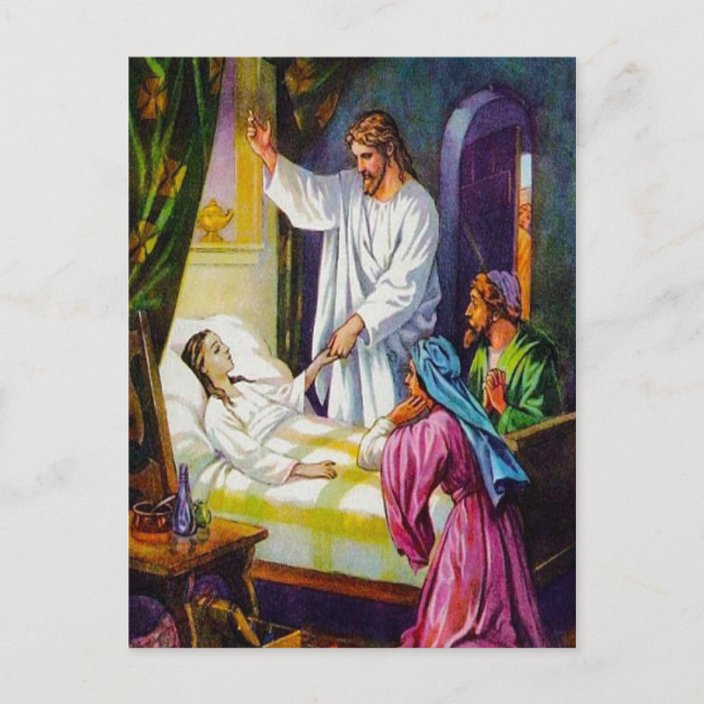Sick of Love || SOS 5:8
Watereth shall be watered
Jairus’s Sense of Need
“A synagogue official came and bowed down before Him, and said, ‘My daughter has just died; but come and lay Your hand on her, and she will live’” (Matthew 9:18).
The accounts of this incident by Mark 5:22 and Luke 8:41 identify the synagogue official as Jairus. And everything he did in this encounter with Jesus demonstrated his humility and sincerity. His request of the Lord was a selfless one for something humanly impossible, and by making it he respected Christ’s power, compassion, and grace. Seemingly unworried about the reaction of his fellow religious leaders, he knew that only Jesus could help his daughter who had just died.
The Holy Spirit had obviously already worked in Jairus’s heart to bring him to this point. His request shows absolute faith that Jesus was able to do what was asked: “come and lay Your hand on her, and she will live.” Jairus’s sense of need was so urgent that he swallowed his fear and pride and came to Jesus without hesitation or doubt.
Often some tragedy such as this drives a person to Jesus Christ. Those who, unlike Jairus, are unaware of need in their lives will usually have no hunger for God. That’s why in evangelism, it is important to show someone their need of salvation and therefore of Christ as the only way to receive it. Jairus saw the emptiness of human resources in this situation and now knew Jesus was his last best hope. He may not have approached the Lord out of the purest motive, because his prime concern was his daughter’s life and his own despair. So his first thought was not solely to glorify Christ, but he did trust Jesus for help in bringing his child back—and he found Him truly accessible.
Ask Yourself
What needs do those around you have, perhaps without even knowing it? Identify several of them. As you go about your day, be aware of the needs they’re expressing. And as opportunities for spiritual conversation arise, show them the answer to their need in Christ Jesus.
The Elect will not be forsaken - Ezekiel 34:16 , 33:18
Good Shepherd seeks the lost sheep - Ezekiel 34:11-12
Happy Independence Day
Hey, here is a person who promises to rescue you from your sin, the LORD JESUS CHRIST. "the wages of sin is death" Rom 6:23
Accepting you're a sinner is a good step and proves that God actively works in your heart. The just God "will not acquit the wicked" Exodus 23:7
Having loved you and me, God made a way by sending HIS only begotten Son Jesus Christ as one of us. JESUS CHRIST bore all our punishment on the cross of Calvary and satisfied God. "while we were yet sinners, Christ died for us" Rom 5:8
God declares forgiveness for all who believe in the LORD JESUS CHRIST, and that HE died for them.
It is not like human forgiveness. When a fellow human forgives us, it means we were good but done mistake for some time and deserves forgiveness. It means we don't do the same mistake again after. But in our case, having done all we acted just like enemies of God. Our "every imagination of the thoughts of his heart was only evil continually" Gen 6:5
We deserve wrath. But God being mercifully reminded us and offered His only Son, a living sacrifice. God never forgives by seeking our future obedience. Divine forgiveness forgave all our sins (past, present and future).
What a great privilege it is for us!
"Christian liberty is freedom from sin, not freedom to sin." ~ A.W. Tozer
Let us happily celebrate our independence day.
If you have taken the life-changing decision of putting your trust in JESUS CHRIST, kindly let us know andrewkingslyraj@gmail.com (or) akrministries@yahoo.com
The End of the Gospel
Devotional by John Piper
Since, therefore, we have now been justified by his blood, much more shall we be saved by him from the wrath of God. For if while we were enemies we were reconciled to God by the death of his Son, much more, now that we are reconciled, shall we be saved by his life. More than that, we also rejoice in God through our Lord Jesus Christ, through whom we have now received reconciliation. (Romans 5:9–11)
What do we need to be saved from? Verse 9 states it clearly: the wrath of God. “Since, therefore, we have now been justified by his blood, much more shall we be saved by him from the wrath of God.” But is that the highest, best, fullest, most satisfying prize of the gospel?
No. Verse 10 says “much more . . . shall we be saved by his life.” Then verse 11 takes it all the way up to the ultimate end and goal of the gospel: “more than that, we also rejoice in God.”
That is the final and highest good of the good news. There is not another “more than that” after that. There is only Paul’s saying how we got there, “through our Lord Jesus Christ, through whom we have now received reconciliation.”
The end of the gospel is “we rejoice in God.” The highest, fullest, deepest, sweetest good of the gospel is God himself, enjoyed by his redeemed people.
God in Christ became the price (Romans 5:6–8), and God in Christ became the prize (Romans 5:11).
The gospel is the good news that God bought for us the everlasting enjoyment of God.







